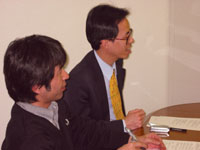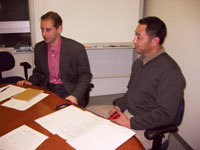Spiderman
Back to Contents of Issue: June 2004
|
|
|
|
by John Dodd |
|
 We don't normally focus on specific IT products, because, frankly, there's something "new" out every day. But occasionally a true breakthrough product comes along that we know our readers will want to use.
Sozon's SeoSpy™ is just such a product, and we believe it will revolutionize the way companies in Japan interact with indigenous Internet search engines.
Surprisingly, the product was developed here in Japan by a foreign entrepreneur: the self-taught engineer and now managing director of his own venture, Amir Ayalon. The venture is called Sozon, an abbreviation of the term "Strategic Optimization Zone," and was started by Ayalon and his two partners, Yasushi Bamba and Takuo Yamanaka. Ayalon is playing a significant role in Japan's Search Engine Optimization (SEO) industry, and we asked him why he thinks Sozon has a strong chance of becoming a major player on the Japanese Internet scene.
Why is a foreigner creating a Japanese product for Japanese users and Japanese search engines?
Maybe it's something to do with my background. I'm not really rooted in any particular place and am just as happy creating products here in Japan as I am anywhere else. I was born in Israel, but from the age of two moved to and grew up in Australia. I came to Japan in August 1994 to study Aikido and have been here ever since -- about 10 years now.
My major interest was marketing, and computers were really just a hobby. However, like many others I caught the Internet entrepreneur bug and set up a company with a partner in 1999. We started out by publishing a subscriber-based, bilingual, offshore tax and investment newsletter. Although it was popular, we had lots of requests to do offshore financial structuring, and moved into capital sourcing and deal making. That led to my interest in starting a business for myself, eventually in the IT field and in Search Engine Optimization.
Originally I found out about SEO from the practical experience of promoting our publishing endeavors back in 1999. I did a lot of the work myself, after reading about how search engines work. While I have no formal computer education, I've always found there have been ample resources available to learn what's needed if you are truly dedicated.
As I successfully promoted our Web sites, other people started asking me for help with their sites, and so my activities naturally evolved into SEO/Online Marketing consulting. What I quickly found out, however, was that many SEO tools available in the US just weren't able to handle double-byte Japanese Web sites. So I was forced to manually go through and optimize client sites. But as any webmaster will tell you, this is a long and tedious task, especially if it has to be frequently repeated due to new content being posted. So in my spare time, I came up with the idea of a Swiss Army Knife-type of integrated SEO tool and finally got to realize that idea last year.
There are quite a few SEO consulting companies out there in Japan, probably over 100, but in terms of a competing software solution, I don't think we have any direct competitors. There are some freeware tools out there, but nothing that an end-user could say contains everything they need. The shareware typically requires software knowledge and does very specific things, such as measuring your page rank or checking a site for keyword density. They are not integrated and they are not easy to use -- indeed, they make SEO hard work.
How would you describe your software? Is it an analysis tool, or do you also automatically modify the target home page as well?
Well, the best analogy is to compare our product to a popular computerized car tune-up firm in Australia called Ultra-Tune. These guys allow a mechanic to hook the machine up to a car engine and analyze everything you'd want to know about the condition of that engine. Then it spits out a recommendation list of repairs and tunings that should be performed. Our product, SeoSpy™, is very similar in concept. It's a toolbox for someone wanting to tune-up their Web site.
But for car tune-up, you basically have to be a mechanic. What about for SeoSpy™?
Our strength is that SeoSpy™ can be used by the client's own novice Web site maintenance people, without any previous knowledge of SEO. The software comes with a very deep tutorial to allow clients to make a proper commitment to getting good SEO results. Also, the reports given by the software tell the user exactly what to do to boost one's SEO ranking -- where to place specific keywords, for example.
Given that your software is fully featured, is it difficult to install?
Not at all. We've built it as an ASP application, meaning that apart from a web browser and Internet connection, nothing else is needed to access it. Plus, it's very simple to use and can be opened by multiple users on multiple machines on multiple operating systems, wherever you are in the world.
The way you use it is that you log in to your SeoSpy™ account using your everyday Web browser, type in the URL of the target site you want to optimize or analyze, then click on whichever functions you want to run. Output from SeoSpy™ comprises both optimization analysis and also recommendations. For example, it can tell you which tags you should add to your site and where to paste them.
We have a translation company client who couldn't get themselves on the first page of an industry search for a relevant term such as "eigo honyaku service." After using SeoSpy™, and getting some consulting input from us, they are now usually in the top five to 10 results returned.
Of course, the value to them is in the actual new business developed, and it's a numbers game. Since they are getting so many more visitors to their site, and because they show up on very specific searches, the quality and volume of actual inquiries coming through has really taken off. As a result, they're making real money.
Another client example is a language school, a Japanese company teaching English, Spanish, French and other languages. They're getting about two to five times more traffic now, and students are regularly signing up on line.
These are regular mid-sized firms you're talking about, not just large brand-name companies?
Exactly. Although we love to help brand-name companies as well, it's the small- to medium-sized enterprise firms (SMEs) that can get the most bang for the buck from a well-executed SEO program.
We imagined that SEO would be expensive. But the price is amazingly cheap.
It's all part of our strategy to set ourselves up as the default standard for SEO in Japan. We've kept the software side of things extremely low-cost, and a package typically starts at JPY30,000 a year per URL. If you were to compare this expense to ads in Internet media, for SMEs at least, the SEO value proposition is very compelling. We also have discount programs for people with a lot of URLs.
That's a great price! Why have you been able to gain leadership in this niche in Japan? There are plenty of SEO software companies in the US.
For foreign SEO companies, Japan is challenging. It's a combination of language issues -- your software has to be able to support JIS, Shift-JIS, and EUC -- and awareness of how Japanese search engines work and rank pages. Foreign SEO firms see Japan as a tough nut, and as a result, they simply don't target the Japanese engines.
One example of how things are different, although this is probably more attributable to time lag, is the way SEO applications in the US have to stay in closer touch with the latest search engine trends.
For example, Google in the US is now placing more ranking weight on semantics (the interrelationship of words to define the meaning and value of a document). In Japan, the engines don't use semantics yet, and the emphasis is more on keyword positioning, linking strategies, et cetera. So for a US SEO company, this would mean having to maintain multiple versions of a software package, keep abreast of changes to multiple engines (for a complex language) in addition to the logistics of providing support to a totally foreign market.
How complex are the calculations you use to get your optimization recommendations?
More than just complexity, a significant issue is having a great deal of experience and experimentation in learning how Japanese search engines work, how they change and how to detect those changes. Part of our intellectual property is in having found out that because most search engines have so many variables, it's often better not to have to know them and think about them all. Instead, we let SeoSpy™ do the brunt of the work by averaging out the results from the vast amount of data coming in to our application every day, analyze any general changes or trends and then modify our algorithms accordingly.
Needless to say, the weightings to get the right results are different for each engine. So rather than reverse engineer, we instead engage in automated analysis to yield patterns and gain a guideline to the right weightings -- one for each major search engine target.
Most people with Web sites imagine that SEO is all about knowing how many times to put a certain word into your page so that it will come up on the search engines -- without inserting it too many times so that you get dumped for "loading" up the Web site on purpose. How do you find out what the threshold levels are?
Most search engines have a page where people can lodge complaints about doctored pages, spammers, et cetera. Your competitors are watching your sites with eagle eyes and will quickly report you if they see anything strange going on. So to a certain extent, the industry is self-governing. The search engine people really do read this user feedback. Search engine spamming, as we in the industry call such doctoring, includes "doorway pages," "cloaked pages" -- pages designed to be served to search engines but not to humans -- and other search-bot sensitive techniques. It's a challenge for search engines to know what is spam and what isn't, and while automation of the process is improving, human involvement is still important.
One of the ways we offer a measurable advantage to our clients is to use a tool within SeoSpy™ called the Spy Tool. This tool analyzes the top ranking sites among your competitors and tells you what they are doing to get those rankings. A nice point is that Spy Tool is search engine specific -- you can find out exactly what you need to be well-ranked in Google versus MSN, which has a different algorithm and needs different tweaking.
Are Japanese web owners aware of the value of SEO to their marketing strategy?
Yes, and there is a demand for SEO knowledge. In a recent issue of the popular Web Designing magazine, the editors did a survey of web designers, asking them what the number one skill was that they wanted to learn. The most desirable skill, equal first with Flash, was SEO. My guess is that this newfound demand for SEO skill is probably driven by customer demand, but there's room for growth.
Two weeks ago we launched a new service called Spidermatic™, which is a free service to automatically track search engine bots (spiders) visiting your site. We expect a reasonable amount of exposure in the Japanese media.
You also supply SEO consulting, correct?
We have gained an enormous amount of expertise in both English and Japanese SEO, and while we service a growing number of requests for SEO consulting, our main focus is on our SeoSpy™ online service. @
|
|
Note: The function "email this page" is currently not supported for this page.


 Who are your competitors in SEO in Japan?
Who are your competitors in SEO in Japan?
 Do you have any customer testimonials to share?
Do you have any customer testimonials to share?



